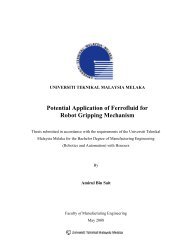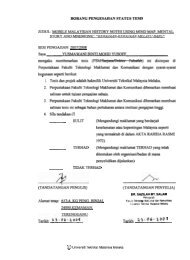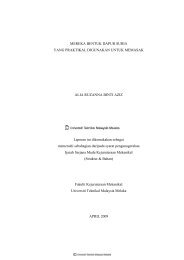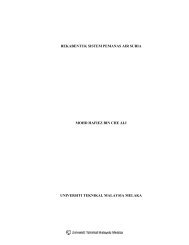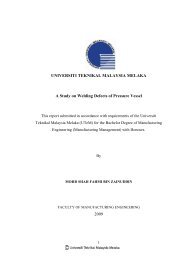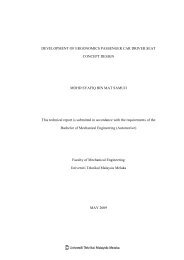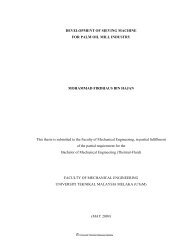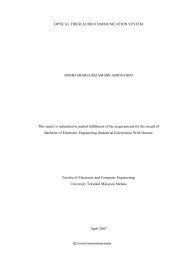Brand, Identity and Reputation: Exploring, Creating New Realities ...
Brand, Identity and Reputation: Exploring, Creating New Realities ...
Brand, Identity and Reputation: Exploring, Creating New Realities ...
Create successful ePaper yourself
Turn your PDF publications into a flip-book with our unique Google optimized e-Paper software.
Simon Cowell <strong>and</strong> <strong>Br<strong>and</strong></strong>ing the X Factor<br />
Chris Hackley, Royal Holloway, University of London, UK<br />
Stephen Brown, University of Ulster, UK<br />
Rungpaka Amy Tiwsakul, University of Surrey, UK<br />
Introduction<br />
Simon Cowell‘s unparalleled empire of stunningly successful TV shows <strong>and</strong> associated web sites, revenue-generating<br />
phone lines <strong>and</strong> million-selling music performers, all br<strong>and</strong>ed under his uniquely powerful TV persona, epitomises the<br />
new marketing priorities of the media convergence era. Yet, breaking down the X Factor marketing machine into its<br />
component parts, interesting though that is, fails to explain the br<strong>and</strong>‘s huge appeal as a cultural phenomenon. This<br />
paper examines the br<strong>and</strong>ing of X Factor from an anthropological perspective, drawing on the work of Victor Turner<br />
(1969) <strong>and</strong> his theory of existential liminality. Turner felt that advanced industrial societies retained a need for rituals<br />
which suspended formal social structures in providing a sense of what he termed ‗communitas‘. The paper sets out<br />
some of the cutting edge br<strong>and</strong>ing innovations which surround the show <strong>and</strong> explores the vivid sense of emotional<br />
connection it has with its audience, emotion which translates into multiple revenue streams. We then explore the show<br />
as a performance of liminal ritual, with Cowell as magus or enchanter, directing the liminal process.<br />
In With a Bullet- the Simon Cowell <strong>and</strong> the X Factor Phenomenon<br />
X Factor has been the biggest show on UK TV in recent years. Owned by <strong>and</strong> starring impresario extraordinaire Simon<br />
Cowell, X Factor has turned the tired old TV talent show format into a golden goose of revenue streams pouring into<br />
Cowell‘s bulging bank accounts. Cowell presides as chief tormentor in the ritual humiliation of countless wannabees of<br />
varying talent. As the shows progress, he releases PR stories of the contestants as the viewers become ever more deeply<br />
emotionally involved in their weekly tribulations. The UK media becomes saturated with coverage of the contestants,<br />
the show‘s judges, <strong>and</strong> of Cowell himself, as the build up to the final gathers pace. Finally, the eight finalists become<br />
mini-stars in their own right, emerging from their dead-end jobs into the showbusiness sunlight, elected by the public,<br />
under Cowell‘s paternalistic direction.<br />
As the pre-eminent entertainment impresario of the digital era, Simon Cowell‘s marketing genius seems beyond<br />
question. But the precise nature of his legendary marketing savvy is an enigma, <strong>and</strong> some of the contradictions in his<br />
CV are striking. For example, by his own admission Cowell can‘t sing, doesn‘t play a musical instrument, <strong>and</strong> doesn‘t<br />
produce records. In an interview with Playboy magazine he admitted that his keynote TV talent vehicle, American Idol,<br />
is a soap opera not a music show. Yet he has sold over 150 million records. As a talent manager Cowell spotted the<br />
music selling potential of acts as unlikely as the Mighty Morphin Power Rangers, the Tellytubbies, Robson <strong>and</strong><br />
Gerome, <strong>and</strong> professional wrestler The Undertaker. Cowell has also enjoyed consistent success with more mainstream<br />
pop artists like boyb<strong>and</strong> Westlife, million-selling 80‘s singer <strong>and</strong> sometime girlfriend Sinitta <strong>and</strong>, latterly, his string of<br />
talent show winners headed by superstar Leona Lewis. Other contradictions are equally arresting. He learned his trade<br />
as an artists <strong>and</strong> repertoire (A&R) man in the record business <strong>and</strong> had no training in TV, yet Cowell holds the rights to<br />
some of the most lucrative TV show formats in history. Even more paradoxically, Cowell claims he doesn‘t know how<br />
to work a computer or an iPod, yet a cursory examination of the web-based activities around his TV shows reveals a<br />
cutting-edge case study in leveraging value from digital <strong>and</strong> social marketing. Finally, <strong>and</strong> most significantly, Cowell<br />
appears to be an opinionated but grounded individual with no pretensions as a performing artist or a business guru. Yet,<br />
leering over the sweeping panorama of his marketing l<strong>and</strong>scape, are the botox-smoothed, fang-capped features of the<br />
most recognisable global celebrity since Muhammed Ali.<br />
Cowell‘s peerless PR <strong>and</strong> expensively veneered smile has made him the biggest reptile the TV celebrity jungle has ever<br />
known. He is a sharp dealmaker who underst<strong>and</strong>s the politics of TV contracts – he is said to have invented the X Factor<br />
franchise to give him more leverage in his contract negotiations with his American Idol partner Simon Fuller. Cowell‘s<br />
modus oper<strong>and</strong>i epitomises the convergence of media, marketing, <strong>and</strong> celebrity culture. At the time of writing, he has<br />
reportedly signed a deal to keep his hit show X Factor on UK TV until 2013 2 . In the meantime, he plans to export the<br />
format to the USA to rival the success of another Cowell vehicle, America‘s Got Talent. X Factor‘s 15-17 million<br />
viewers per show make it by far the biggest show on UK TV. Those real time viewing figures have leveraged the price<br />
of 30-second advertising slots up to an estimated £150,000, rising to £250,000 for the series final. Other revenue<br />
streams bubbling from the X Factor spring include income from viewer phone voting with up to 8 million calls per<br />
show, sponsorship deals on the main show <strong>and</strong> its spin-off show Xtra Factor, <strong>and</strong> additional interactive <strong>and</strong> online<br />
content revenues from the show‘s website, ITV.com/TheXFactor. The website attracted more than 95 million page<br />
views <strong>and</strong> 30 video views during the 2009 series. Downloads of the performances featuring on the show generate<br />
revenue that is shared between Freemantle, the production company that makes the show, ITV, the UK commercial TV<br />
channel that shows it, <strong>and</strong> ITunes. The website also sells tickets for national tours of sell-out live shows featuring the<br />
performers. There is a spin-off magazine, <strong>and</strong> last but not least there are record sales from the most popular contestants,<br />
2 http://www.telegraph.co.uk/finance/newsbysector/mediatechnology<strong>and</strong>telecoms/media/8071827/Simon-Cowellsecures-deal-to-extend-The-X-Factor-for-three-more-years.html<br />
77



